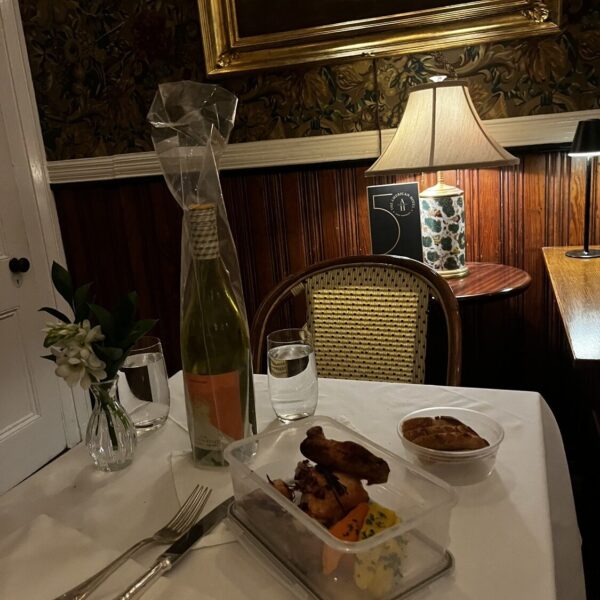

“Etiquette is the science of living. It embraces everything. It is ethics. It is honor.” — Emily Post
Dear Ms. Eco-Manners,
Last week I was on a date with someone I didn’t know very well and we were splitting the dinner bill. The restaurant portions were larger than I expected. So as not to waste food, I first asked my date if they would like to take home the leftovers. When they declined, I asked the waiter for a doggy bag. I was surprised and really embarrassed when my date made a comment about bad manners. Is it rude to ask for a doggy bag on a date?
Sincerely,
Doggy Bag Dater in the Hamptons
Dear Doggy Bag Dater,
I understand your chagrin concerning doggy bags, or Le Gourmet Bag as they say in France. After all, the phrase “doggy bag” was created as a dubious subterfuge of being for one’s dog, rather than oneself. But rest assured, today most people don’t want to let good food go to waste and don’t think twice about getting their food to go.
The restaurant industry can be particularly challenged when it comes to waste. According the nonprofit ReFED, restaurants in the United States generate about 11.4 million tons of food waste annually. The industry as a whole accounts for 78 percent of all disposable packaging.
Although restaurant kitchens operate on thin margins, wasting as little as possible, it’s what’s left on our plates that creates the most waste. Every time an uneaten salad or untouched bread basket heads back to the kitchen, we’re not only throwing away food (and money!), but squandering the enormous amount of resources that went into producing it: seeds, fertilizer, labor, water, and the fuel it took to grow, process, transport, prepare and store the food. Reducing food waste is so important in fact, that Project Drawdown ranks it as the number three solution for reversing global warming.
In light of how wasted resources are contributing to climate change, restaurant etiquette is changing almost as fast as the climate itself. These days, the only bad manners would be not taking your food home.
I’m not sure what code of conduct your date is following, but doggy bags were fashionable long before we began extracting fossil fuels from the ground and flambéing the planet. It was the ancient Romans who started the doggy bag movement. According to an article in Smithsonian Magazine, dinner guests back in the day were accustomed to bringing napkins to the table to package foodstuffs to take home. It was considered rude not do so, as it was seen as a sign of appreciation for the meal.
Chef Doug Gulija of The Plaza Cafe in Southampton would concur. “It’s a big compliment to the chef when people ask for their food to go. It shows that they really enjoyed the food and respect what they’re eating.”
Since you do seem care about food waste, let me share with you some basic eco-dining strategies:
Th first step in sustainable dining is to consider the restaurant. Buzz words like “farm to table” and locally sourced” are bandied about everywhere these days, as it should be. The quick trip from a local farm to the table requires a lot less fuel for transport and packaging.
Out East, locally sourced food should be a given. Why would we be surprised that restaurants surrounded by farms, vineyards and fisheries are using local ingredients? The fact that a restaurant serves local potatoes on the East End does not a sustainable restaurant make.
While partnering with local farms and suppliers happens in surprisingly few Hamptons kitchens, some restaurants do it really well. Places like Almond, Nick & Tony’s and Jean-Georges may have to charge a bit more, but they work very hard to source almost everything locally for freshness and quality. Chef Jason Weiner of Almond Restaurant sees sustainability in terms of a supply based model, rather than demand based.
“It’s about having a conversation with your local producer to find out what they have … then coming up with the dish,” says Weiner. “Art Ludlow over at Mecox Farms says he has ribs today? We put that on the menu.”
The next step, no matter where you dine, is to make more planet-friendly choices. Start by skipping the beef. For the most part, the process of growing vegetables is much less taxing to the environment than traditionally raised livestock which require enormous resources and makes up 14 percent of all greenhouse gas emissions (more than the entire transportation sector).
But fear not, fellow carnivores. Some beef is better than others. Mecox Farm and Acabonac Farm are good examples of local farms that raise cows sustainably.
When these cows give up cattle feed and go vegetarian, they help draw carbon back into the soil, and burp less planet-warming methane. The only restaurant that consistently serves sustainably raised, local beef is the 1770 House in East Hampton, whose burgers are phenomenal.
Always ask the server what’s in season and local. Most restaurants worth their salt (or local Amagansett Sea Salt), include something local on the menu. Drink local as well. Transport and glass packaging contribute to 68 percent of the wine industry’s carbon footprint. The Plaza Cafe offers 21 local wines, but most restaurants offer a few local options.
Ordering tap water or beer on tap helps cut back on the glass and plastic waste used in shipping, as well as CO2 generated in production. Almond Restaurant serves a doubly sustainable brew — all of its beer on tap is also local.
Finally comes the best part of the meal. Extending it with leftovers. Most high end restaurants now use recyclable, biodegradable brown boxes, but the best “to go box” is your own Tupperware. Owner Colin Ambrose, of the deliciously eco-minded Estia’s Little Kitchen, notes that restaurants really appreciate when customers bring in reusable containers. “It saves the restaurant time and the cost of take out boxes, which are surprisingly expensive.”
Remember not to leave your food at the restaurant. Or in the car. Or on the kitchen counter. And then don’t let it disappear into a black hole of leftovers. It’s amazing how many well-intentioned meals die a slow death in the back of the fridge, rather than being the Michelin star midnight snack they deserve to be.
Now that you’re familiar with the eco-manners of modern day dating, the question is — how much further would you go to avoid food waste? Would you ask for your leftovers to be boxed up at a business lunch? Wrap up the communal bread basket amongst friends? How about a wedding where the caterers plan to discard it? Someday, we’ll look back on tossing out uneaten food as a form of insanity… in any situation.
And regarding this slightly uninformed date of yours. One of these years they’ll get it. And in the meantime, who knows? Maybe one of the Koch brothers will ask them out.
Seriously Sustainable Restaurants:
Almond Restaurant (Bridgehampton): Specializes in hyper-local fare, including fresh-caught seafood. All beer on tap is local. Check out the Adobo Duck from up island.
Jean-Georges at Topping Rose House (Bridgehampton): Works with nearby farmers and fisherman. Produce grown on restaurant’s one-acre farm for seasonal dishes. All white fish is local. Try the delicious olive bread from Carissa’s Bakery.
The Plaza Cafe (Southampton): Serves mostly seafood and mostly local. Pair meals with 21 different local wines. Special kitchen station just for artfully arranging to go boxes, adding extra sauce where needed.
Nick & Toni’s (East Hampton): Serious farm-to-table with 30 percent of produce harvested daily from the restaurant’s one-acre organic farm. Works closely with Balsam Farms and local fisheries.
1770 House (East Hampton): More than just local Acabonac Farm raised burgers, 80 percent local fish, ingredients from sustainable partners in the New York area. Check out the fluke tartar.
Panera Bread (Bridgehampton): Little green fork icon on the menu indicates choices that have a 38 percent lower carbon impact than regular items. Currently 55 percent of entrees fall under this designation. They really cut back on food waste by donating leftover meals to local food pantries every single night.
 More Posts from Jenny Noble
More Posts from Jenny Noble